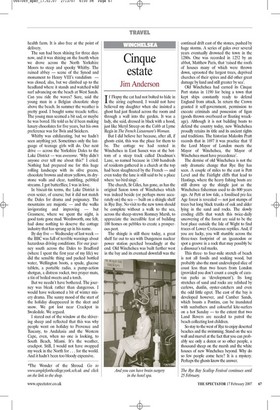Cinque estate
Jim Anderson T f Flopsy the cat had not bolted to hide in 1 the airing cupboard, I would not have believed my daughter when she insisted a ghost had just floated across the room and through a wall into the garden. It was a lady, she said, dressed in black with a hood, just like Meryl Streep on the Cobb at Lyme Regis in The French Lieutenant's Woman.
But I did believe her because, after all, if ghosts exist, this was the place for them to be. The cottage we had rented in Winchelsea in East Sussex was at the bottom of a steep track called Deadman's Lane, so named because in 1360 hundreds of residents gathered in a church at the top had been slaughtered by the French — and even today the lane is still said to be a place where 'no bird sings'.
The church, St Giles, has gone, as has the original Saxon town of Winchelsea which was indeed beside (or perhaps more accurately on) the sea — built on a shingle shelf in Rye Bay. No visit to the new town should be complete without a walk to the sea, across the sheep-strewn Romney Marsh, to appreciate the incredible feat of building 100 homes on pebbles to create a prosperous port.
The shingle is still there today, a great shelf far out to sea with Dungeness nuclear power station perched broodingly at the end. Old Winchelsea was built further west in the bay and its eventual downfall was the continual drift east of the stones, pushed by huge storms. A series of gales over several years eventually drowned the town in the 1280s. One was recorded in 1252 by an abbot, Matthew Paris, that 'raised the roofs of houses many of which were thrown down, uprooted the largest trees, deprived churches of their spires and did other great damage by land and still greater by sea'.
Old Winchelsea had earned its Cinque Port status in 1190 for being a town that kept ships constantly ready to defend England from attack. In return the Crown granted it self-government, permission to execute criminals and possession of ligan (goods thrown overboard or floating wreckage). Although it is not building boats to defend the country today, new Winchelsea proudly retains its title and its ancient rights and traditions. The historian Malcolm Pratt records that in 1697 it was practice that 'if the Lord Mayor of London meets the Mayor of Winchelsea, the Mayor of Winchelsea must have precedence'.
The demise of old Winchelsea is not the only dramatic change that Rye Bay has seen. A couple of miles to the east is Pett Level and the Fairlight cliffs that lead to Hastings, where the heavy fishing boats are still drawn up the shingle just as the Winchelsea fisherman used to do 800 years ago. At Pett at low tide, a fossilised pre-Ice Age forest is revealed — not just stumps of trees but long black trunks of oak and alder lying in the sand and rocks. The slowly eroding cliffs that watch this twice-daily uncovering of the forest are said to be the best place outside the Isle of Wight to find traces of Lower Cretaceous reptiles. And, if you are lucky, you will stumble across the three-toes footprint of an iguanodon or spot a groove in a rock that may possibly be a dinosaur's tail marks.
This threeto four-mile stretch of beach is not all fossils and soaking wood, but probably also the most undeveloped slice of coast less than two hours from London (provided you don't count a couple of caravan parks as 'development'). Its long stretches of sand and rocks are relished by curlews, dunlin, oyster-catchers and even the odd little egret. The east of the bay is developed however, and Camber Sands, which boasts a Pontins, can be inundated with sunbathers and colourful kite-surfers on a hot Sunday — to the extent that two Land Rovers are needed to patrol the beach collecting lost children.
So stay to the west of Rye to enjoy deserted beaches and the swimming Stand on the sea wall and marvel at the fact that you can probably see only a dozen or so other people, a thousand sheep on the marsh and the white houses of new Winchelsea beyond. Why do so few people come here? It is a mystery. Perhaps the ghosts know the answer.

























































 Previous page
Previous page